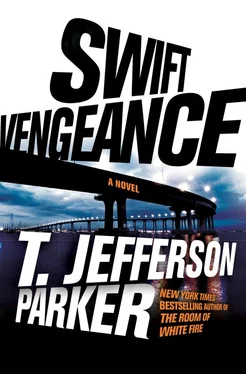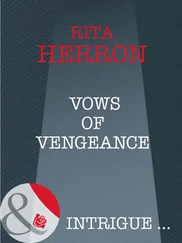I nodded.
“Get it.”
My leash was long enough to reach the toolbox bolted into the bed of my truck, from which I took my .45 autoloader, snug in its clip holster. Which I slid between waistband and flank, right side, grip resting in the hollow below my rib cage, snug and easily hidden by my coat. I have a two-shot ankle cannon, too — a four-ten shot-shell over a very hot .357 magnum — prodigiously lethal and made for only the most desperate of straits. I decided against it.
Taucher stood under the thin palms in her black suit, her back to me as she watched the apartment. Square of shoulder, platinum of hair. A businessperson, perhaps. A professional. An undertaker. She struck me as alone in her world, a solitary hunter, though she could have a rich family life, close friends, and strong interests that she had never once mentioned. And why should she? I probably had her all wrong.
We were halfway to unit 24-A when I saw the red “For Rent” sign hanging in the front-porch window. We stopped and for a long silent moment let the defeat sink in.
Caliphornia , I thought: dancing away, a step ahead of us.
As in Bakersfield.
As in last night after the Treasures of Araby?
In this moment it felt like Caliphornia could stay ahead of us for quite a while. I chose not to imagine the carnage that he could deliver with six-thousand-plus rounds of ammunition and a few guns to fire it with.
Who are you?
How can we bring you to us?
What will you fall for?
What do you need?
“So is this bad luck or fate?” asked Joan. “Maybe I should consult Al Ra’ad like Marah and Ben. I bought a Qur’an right after Nine-Eleven. Trying to get a feel for what I was up against. Maybe that was politically incorrect, but I reasoned that religious extremists start with religion. There’s a lot of violence in that book. It’s real us-against-them kind of stuff. I read parts of it. Not the whole thing.”
I thought of the good Muslims I’d run across in my life. From Fallujah to San Diego. “Islam is the hostage,” I said, quoting Hadi Yousef.
“Maybe.”
“Blame the terrorist, not the excuse,” I said.
“I’m trying to. Now this son of a bitch moves out of his apartment on me.”
We stood on the porch. Taucher knocked and rang the doorbell anyway, but the silence inside wouldn’t budge. I looked through a crack in the beat-up plastic blind, saw a sparsely furnished room. Beige carpet. A defeated leather sofa. Fast-food litter.
I tried the door but no luck.
“There’s that optimistic Boy Scout again.”
“I told you I was a Comanche.”
“They were sport rapists and torturers,” said Taucher. “They didn’t even need a religion to blame it on.”
“They did it for homeland security,” I said.
“Like me,” said Taucher. “At work they call me Joan Wayne but they think I don’t know.”
When I turned away from the window I saw that Taucher was dialing a number on her phone. “Yes, hello, this is Joan Taucher and I’m here on the front porch of unit twenty-four-A in the Del Sol Apartments. I want to see it right... Yes, well, that’s not good enough. I need a place to rent now ... Thursday is fine for move-in, but I have to make a deposit today. I need to see it right now. I love the neighborhood, the palm trees, the lunch truck... everything.”
She looked at me and rolled her eyes. “So how long can it possibly take you to get here and show me this place?”
She looked at me again, then at her watch. “You’re kidding... Really? Wonderful! I’m here with my business partner right now. We’ll see you in just a moment.”
Joan swiped off with a flourish, dropped her phone back into her bag. “Joan Wayne speaks, people listen.”
The manager was a middle-aged man named Ernest Robles. That his name meant “oaks” I took as a good sign. He was thick-bodied and gray-eyed and his silver-black hair was brushed back from a ruddy, pleasant face. White shirt with the sleeves rolled up, tucked into pressed jeans, square-toed cowboy boots. We introduced ourselves and shook hands. He gave me a long look — stoic and calm — letting me know that he was not afraid of me. Big men get this often from smaller men. It took me some years to realize it’s a warning wrapped in respect.
He let us into a cool room that smelled faintly of tobacco and lamb.
“The tenant left early this morning,” he said.
Taucher gave me an unhappy look, then moved into the middle of the small living room, hands on her hips in a proprietary stance. “What about the smoke smell?”
“I’m painting on Monday,” said Ernest. “The new carpet comes on Tuesday. And full cleaning Wednesday. It won’t smell.”
“What a relief,” said Joan. “The former tenant was a man, I take it. By the bad housekeeping.”
Ernest nodded, looked for my reaction. “Not the cleanest tenant. Not the worst, either. Not by far.”
Taucher turned to him. “What’s rent?”
“Seventeen hundred a month. Thirty-four hundred moves you in.”
“No wonder the poor stay poor,” said Joan. “How long was the smoker here?”
“Six months.”
“Hard on the carpet, too,” she noted, looking down. “Where did he go?”
“I don’t know,” said Ernest. “He told me late last night he was moving out. He was paid up until the end of the month.”
“How old was he?” Joan asked.
“Young. Early twenties.”
Taucher held her phone up for Ernest to see. “This him?”
Ernest looked hard at the screen, at me, then Joan. “If you’re cops, just say so.”
“Yes or no?” she pressed.
“I want no trouble.”
“You’ll get trouble if you don’t answer me,” said Taucher. She held the phone closer to him.
I wondered how Joan had gotten so good at handling people so badly. Part of Fed 101? She would happily make sows’ ears out of silk purses all day long, and nobody could stop her. She had what Grandpa Dick called “countercharm.” I wondered, not for the first time, if she even knew it.
“Yes,” said Ernest, cool and offended. “That’s him. But that’s all I can say.”
“It certainly isn’t,” Joan said.
“Are you serious about renting this unit?” he asked. “I have an obligation later today.”
“Business partner,” said Taucher, turning to me. “Maybe you can explain this best.”
I nodded. “Mr. Robles, can I have a word outside with you?”
That look again, telling me he wasn’t afraid. “I don’t want trouble.”
Outside in the cool afternoon sun I told Mr. Robles who we were. And that we were looking for a very dangerous man who may or may not be his former tenant. That got his attention and his interest. He wanted to know if this dangerous man might come back here. “If we could have a look around, and ask you a few questions, it would be a big help. I don’t have to tell you this, but you should know that a woman’s life is at stake.”
He scanned my face with his gray eyes, then looked past me, back into the unit. “I thought you were a couple at first.”
“No,” I said.
“You must be very relieved,” said Robles, with a small smile. “The tenant, his name was Ben Anderson.”
Because he always made up last names , I thought. Always started with A .
“May we look through your apartment?” I asked. “Maybe photograph a few things?”
“Yes. He was an interesting young man. I’ll tell you what I know.”
Back inside, Taucher and I went through the kitchen as Ernest Robles did as promised.
“He was pleasant but said little about himself. He had a soft personality, like a priest. He never smiled. His clothes were always the same — sweat shorts or sweat pants and athletic shoes. Flannel shirt, plaid. Sweatshirts with hoods. A wool cap if it was cold. His hair was long and black but bleached by the sun. Like a surfer, but I never saw a surfboard. He worked during the day, but I don’t know where.”
Читать дальше












